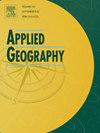A convergence research approach to resolving ‘wicked problems’: Lessons from an interdisciplinary research team in land use science
IF 4
2区 地球科学
Q1 GEOGRAPHY
引用次数: 0
Abstract
Many contemporary social and environmental problems are increasingly ‘wicked.’ Convergence research offers an effective approach to tackle wicked problems by integrating diverse epistemologies, methodologies, and expertise. Yet, there exists little discussion of how to develop and employ a convergence research approach. This article describes our collaborative research efforts to achieve convergence research and team science. For over a decade, we have sought to understand how drug trafficking activities, and the counternarcotics efforts designed to thwart them, catalyze catastrophic changes in landscapes and communities. We first discuss how understanding our wicked problem called for epistemological convergence of diverse data through a team science approach. We then unpack the potential insights and challenges of methodological convergence by drawing upon examples from our land cover and land use change analysis. Third, we argue that the nature of complex, pressing problems requires convergence research to be politically engaged and accountable to the multiple communities affected. This article aims to provide research teams insight into how to pursue epistemological and methodological convergence while attending to the inherent politics of producing knowledge about wicked problems.
解决“棘手问题”的趋同研究方法:来自土地利用科学跨学科研究团队的经验教训
许多当代社会和环境问题变得越来越“邪恶”。“融合研究通过整合不同的认识论、方法论和专业知识,为解决棘手问题提供了有效的途径。然而,关于如何发展和运用趋同研究方法的讨论却很少。这篇文章描述了我们合作研究的努力,以实现收敛研究和团队科学。十多年来,我们一直在努力了解毒品贩运活动以及旨在制止这些活动的禁毒努力是如何促成景观和社区的灾难性变化的。我们首先讨论如何通过团队科学方法来理解我们的邪恶问题,这需要不同数据的认识论收敛。然后,我们通过我们的土地覆盖和土地利用变化分析中的例子,揭示了方法趋同的潜在见解和挑战。第三,我们认为,复杂、紧迫问题的本质要求融合研究在政治上参与,并对受影响的多个社区负责。本文旨在为研究团队提供见解,以了解如何追求认识论和方法论的收敛,同时关注产生关于邪恶问题的知识的内在政治。
本文章由计算机程序翻译,如有差异,请以英文原文为准。
求助全文
约1分钟内获得全文
求助全文
来源期刊

Applied Geography
GEOGRAPHY-
CiteScore
8.00
自引率
2.00%
发文量
134
期刊介绍:
Applied Geography is a journal devoted to the publication of research which utilizes geographic approaches (human, physical, nature-society and GIScience) to resolve human problems that have a spatial dimension. These problems may be related to the assessment, management and allocation of the world physical and/or human resources. The underlying rationale of the journal is that only through a clear understanding of the relevant societal, physical, and coupled natural-humans systems can we resolve such problems. Papers are invited on any theme involving the application of geographical theory and methodology in the resolution of human problems.
 求助内容:
求助内容: 应助结果提醒方式:
应助结果提醒方式:


